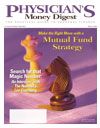Learn Five Investment Lessons from 2005
Now that you have takencare of your urgentchores for the new yearand made your resolutions,it is time to reviewyour investment plans and draw on someof the lessons we have learned in 2005.
1) Have reasonable expectations.In 2005, the total return for the S&P500 was 4.9%. The broader Dow JonesWilshire 5000 returned 6.1%. Both ofthese indexes do not compare with thelong-term average annual return for theS&P 500—10.5%.
My advice:
What the future holds is a topic ofhot discussion on Wall Street and inacademia. One group believes that wecan expect returns comparable to thehistorical average of about 10% peryear over the next 10 to 20 years. Theother group argues that stocks willprovide an average annual return ofaround 6%. This difference is huge.Which return should you count on?Base your savings target on6%. If the returns are much higher inthe next 5 or 10 years, you can cutback on your savings rate.
2) Use a mix of index funds. Forthe past several years, small cap stockshave significantly outperformed largecap stocks. In 2005, the two groupsperformed at about the same rate,although mid cap stocks fared muchbetter than both small cap and largecap stocks. (Note that this comparisondepends on the index.)
Despite the confident predictions ofexperts, the reality is that no one can tellwhich group of stocks will do betterthan the others over the next year or 2.Based on research results, a physicianinvestor'sportfolio should emphasizemid cap and small cap stocks over largecap stocks, and value stocks overgrowth stocks. Latch on to this styleallocation, and stick to it over time. Youcannot just buy and hold an S&P 500or total market index fund. Instead, createa portfolio with the right style allocationby mixing low-cost traditionalindex funds and exchange-traded funds.Do not be too clever and try to keepadjusting the style allocation percentagesbased on someone's predictions.
3) Diversify internationally. Foreignstocks were the stars of last year's show.Foreign market stocks returned 14.9%,and emerging-market stocks were up aspectacular 34.1%—despite a strengtheningof the dollar by about 13%. Thelesson here is that a lot of the goodreturns will come from foreign markets,and you should invest between 20% and40% of the stocks within your portfolioin foreign stocks.
While emerging markets will probablyperform the best in the next decadeor so, be very careful with your investmentsin those markets. They carry ahigh level of risk and may be significantlyoverpriced at this point. Do not gooverboard with your allocation or chasespecific countries; diversify broadlyamong emerging markets. Also, use dollar-cost averaging over time instead ofmaking large investments at one time.
4) Consider cash instead ofbonds. If you had just left your moneyin cash in 2005 (ie, in a good moneymarket fund), you would have earned areturn of 3%. This is nothing exciting,but cash as a fixed-income investingoption yielded better results than whatyou would have earned in bond fundsof most maturities.
At times when bond yields are verylow and the outlook is uncertain, it iswiser to leave a good part of your fixedincomemoney in money market funds.At the moment, 2006 seems to be shapingup as one of those times when cashwill outperform bonds.
5) Know thyself. What do I mean?Look at your investment performancefor 2005 and earlier years objectively. Ifyour portfolio has not been doing well,be honest with yourself about what theproblem is. The reality is, most peopledo not know enough about investingand do not have the right attitude ortemperament to be a good investor. Ifyou are one of them, decide to eitherdevote a lot of time and effort to learnhow to invest well, or find honest andcompetent help. You can never make upfor the years you waste earning inadequatereturns.
Chandan Sengupta, author of The Only
Proven Road to Investment Success (John
Wiley; 2001) and Financial Modeling Using
Excel and VBA (John Wiley; 2004), currently
teaches finance at the Fordham University
Graduate School of Business and consults with individuals
on financial planning and investment management. He welcomes
questions or comments at chandansen@aol.com.
